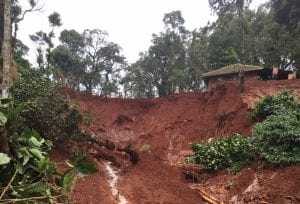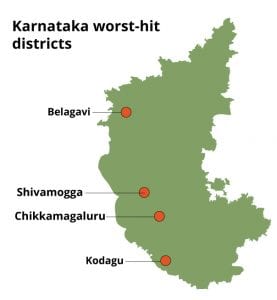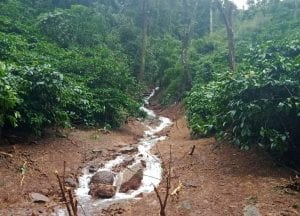
In flood-hit Kodagu, landslide adds to coffee planters' woes
Heavy rainfall that lashed Kodagu in the first two weeks of August caused severe damages to the coffee and spice plantations in the district, which accounts for 45 per cent of Karnataka’s coffee production.

Heavy rainfall that lashed Kodagu in the first two weeks of August caused severe damages to the coffee and spice plantations in the district, which accounts for 45 per cent of Karnataka’s coffee production.
The district officials, who are still analysing the damages, have pegged an initial estimate of 45,000-60,000 hectares of crop losses. Plantations in Virajpet faced the brunt once again, while they were recovering from the damages caused by the floods last year.
Kodagu accounts for 1,07,089 hectares of the total 2,44,785 hectares coffee plantations in Karnataka, according to a May 2018 report by the Coffee Board of India. About 75 per cent of them are Robusta coffee while the rest are of Arabica variety.
Also Read: Chigadolli, a village in Belagavi that continues to drown in sorrow

Speaking to The Federal, Agastya Mandappa, who owns 15 acres of coffee plantations in Kedamallur, said that the landslides washed away his labourers’ quarters, which was perched on the slopes of the coffee estate. There, four people had gone missing last week and only one body was recovered from the debris on August 15, he said. A search is on for the other three.
The 36-year-old estimated a loss of ₹3 lakh an acre considering the plantation development cost for five years. Further, he said that the standing crops, which could have yielded 150 bags of coffee beans in six acres of land, have been completely destroyed.
“Due to bad weather during the summer and the floods during monsoon last year, the yield was low. This year, we expected it to be better. For each bag, I would have earned ₹3,000,” Mandappa said.

Coffee planters across the district had similar stories to narrate. Many lost their land holdings either in part of full, considering the severity of the landslide caused by floods.
Between August 6 and 12, Kodagu district received seven times more rainfall than the average, and its Virajpet taluk alone accounted for 917 mm as against a normal of 109 mm.
While standing crops were washed way on the one side, the intensity of the rainfall led to the fall of berries (coffee beans) on the ground. Also, the planters now fear that the excess moisture content in the soil may attract pests and destroy the remaining crops.
In Ponnampet, Praveen PR, who runs a home stay in his coffee estate, can no more run his business. The home stay and his coffee plantations both stand completely damaged.
Also Read: Kodagu grapples with rain, landslide and extreme weather

Further, he said that berries falling off during monsoon is a common occurrence, but the intensity this year was severe as compared to that of previous years.
“I have sent away about 18 of my workers since there’s nothing to do here now and as their properties in their villages are also damaged,” he said. “It may take at least two months for normalcy to return.”
Achappa HB of Codagu Planters’ Association said that the damages this year were more than what they had last year due to floods, and plantations in Gonikoppa and Balele were the worst affected. While the Association did not estimate the crop losses, they would make a representation to the government for early release of the flood relief and crop damage funds.
Last year, the Coffee Board had received nearly 10,000 application requesting compensation for the damages caused to crops like cardamom, pepper, coffee and orange. While many remained dissatisfied with the compensation they received, this year’s losses added to their woes.
Also Watch: Gokak Taluk needs a rebirth in Belagavi

